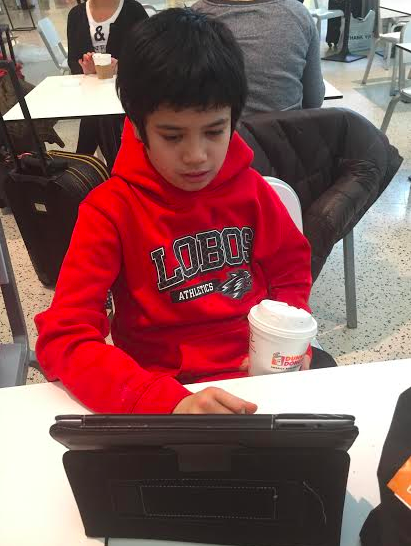My 12-year-old son, Philip, has nonverbal autism but can communicate with others by typing. He keeps a blog where he describes his experiences living with autism and clears up common misconceptions. He wrote this essay in response to the question, “What do you want people to be aware of on Autism Awareness Day?”
 I want people to know autism is another way of being. I am weary of stereotypes that make us out to be less human than neurotypical people. I have listened to people talk negatively about autism since I was diagnosed and, as a result, I learned to hate myself and think I was a monster for causing so much hardship. I can’t let others continue living under these common misconceptions about autism.
I want people to know autism is another way of being. I am weary of stereotypes that make us out to be less human than neurotypical people. I have listened to people talk negatively about autism since I was diagnosed and, as a result, I learned to hate myself and think I was a monster for causing so much hardship. I can’t let others continue living under these common misconceptions about autism.
Let’s pretend you are like me. You can’t talk, but you have a well-functioning mind and can understand people. Imagine you answer everyone who says something to you, but only you can hear it. Others hear your voice saying things you don’t necessarily mean. They think that’s all you are capable of thinking. People see your repetitive flapping or tapping and they think it serves no purpose. They don’t understand that the minute you stop, the moment is flooded with lights that hum, loud sounds that echo, kids moving too fast for you to keep up with and people trying to engage with you. It is hard on me to put my stimming away, but I try.
People see your hyper movement. They prefer you sit quietly. It’s hard for me to feel my body in space, so I prefer to move because I can feel my body better.
In school, interesting subjects like math, science, social studies and language arts stimulate my thinking, ease my mind and teach me something about the world. I did not always feel this way. Many years of my life were spent in an Applied Behavior Analysis (ABA) school. I had to do my drills over and over until I was bored and frustrated with my teachers. Then I would have meltdowns. For me, ABA is not a solution. I experienced long hours meeting goals like pointing to flashcards and pointing to my own nose. I believe people need to be able to set their own goals. No person should be without a voice. I believe in teaching communication first. Meaningful communication means being able to say what I want to say. People must believe we are capable and that our minds are intact.
My parents have been great. They support me by communicating to others about autism and me. They play. They make my life as normal as possible.
I peacefully make friends now. I learn normally. My school values me, and I make my own goals. I feel loved when I am accepted. I feel loved when I am seen not by my momentary deficits but by my attributes that make me a complete person.
I think living with autism is no better or worse than living a typical life. Each life is special in its own way. I love my life with autism.
This post originally appeared on Faith, Hope, and Love… With Autism.
